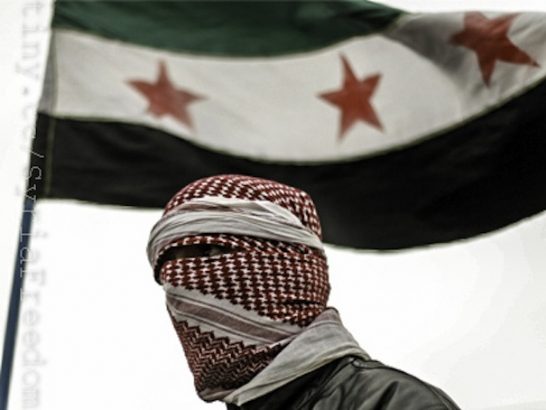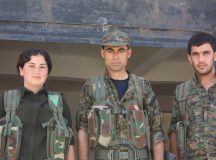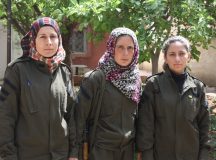As Parliament is set to debate joining the coalition against ISIS in Syria, BICOM Senior Visiting Fellow Brig. Gen. (res.) Michael Herzog assesses Western options. He argues that while air strikes can contain ISIS, only troops on the ground can defeat it. Only a clear show of determination by Western powers can successfully recruit local forces to an anti ISIS coalition, so the West should ally with Syrian Kurds and select Sunni tribes in return for autonomy in a ‘day after’ political solution. Safe zones in Syria should be created and maintained to mitigate the human tragedy while the West also needs a comprehensive strategy to counter ISIS’s ideological appeal. While focusing on ISIS, Western policy makers should try and prevent the empowerment of the Iranian-led axis.
For Israel: ISIS is bad, but the Iranian axis the graver threat
Syria has become the epicentre of global jihad, regional turmoil and a humanitarian catastrophe, emitting waves of terrorism, instability and refugees far beyond the Middle East. What started as a civilian protest five years ago has turned into a bitter sectarian and proxy battle-ground, drawing in thousands of young Muslims – Sunnis and Shiites – to rival camps, as well as external forces competing to shape the end-game.
Whilst the war in Syria sends destabilising shock-waves to neighbouring countries, Israel has been the least affected, successfully staying away from a war in which it does not have a direct stake. But whilst it is neither part of the war nor the diplomatic efforts, Israel remains an important stakeholder in the future of its northern neighbour.
Looking at Syria and Iraq, Israelis naturally share Western concerns over the so-called Islamic State (ISIS), and its capacity to project both terrorism and its ideological message around the region and the world. ISIS represents not only a radical anti-Western ideology but is also virulently and explicitly anti-Semitic. It already has affiliates operating along Israel’s borders with Egypt and Syria and it poses a direct threat to key Western ally Jordan – an essential anchor of stability and moderation, with which Israel shares its longest border.
While ISIS is under constant military pressure, it is far from being defeated. Moreover, according to Western intelligence, the recent attack in Paris indicates a shift in its mode of operation from inspiring and inciting jihadi terror attacks in the West to actually guiding them. This also raises concerns that a competition of sorts may now develop between ISIS and Al-Qaeda in orchestrating attacks against the West.
However, at this point ISIS is not focused on Israel, and is therefore not considered by Israelis to be a direct and immediate strategic threat to them. From an Israeli perspective, the gravest strategic threat still comes from the Iranian-led axis.
Iran is a regional power deeply hostile to Israel, harbouring hegemonic and nuclear ambitions and commanding the region’s most heavily armed sub-state actor, Hezbollah, with over 100,000 rockets aimed at Israel. Assad’s remaining territory in Syria serves as a vital conduit for feeding, replenishing and upgrading Hezbollah’s huge rocket arsenal. Iran also supports terror groups in Gaza, seeks to establish terror infrastructure in the West Bank, supports Hezbollah’s international terror network and activities and launches continuous cyber-attacks against Israel. That is why Israelis judge developments in Syria first and foremost in the broader context of the danger posed by this axis.
Israeli concerns were further exacerbated by the nuclear deal between Iran and the international community, which Israelis perceive as boosting Iran in the context of a region in meltdown. Indeed, hopes that the deal might improve the situation in Syria have proven unrealistic. It is highly likely that the Iranian nuclear deal that answered a paramount Russian interest as well as the perception in Moscow of American weakness cleared the way in Russia’s mind to deploy militarily in Syria in order to save Assad and boost its own standing. Consequently, the emboldened Iran-Assad axis has escalated its military operations under Russia’s air umbrella, focusing on anti-Assad elements rather than on ISIS. In response, Gulf states are ramping up their support to Sunni rebel groups. With more fuel on the fire come more refugees.
But the negative fallout of the nuclear deal goes further. Since the deal was finalised, Iran’s Supreme Leader, Ayatollah Ali Khamenei, has publicly slammed the door on Western hopes to effectively expand cooperation and ordered a ban on imports from the US. Iran test-fired a new ballistic missile in contravention of a UN Security Council resolution and announced it will increase its defence budget by over 30 per cent. Tensions between Iran and Saudi Arabia have risen to new heights, including, at the end of September, the Saudi interception of an Iranian ship laden with missiles allegedly bound for Iran’s proxies in Yemen. For now, President Obama’s expressed hope that the nuclear deal will enable regional ‘equilibrium,’ seems a distant dream.
Why Israel is not banking on a diplomatic solution in Syria
Whilst the major external powers finally set a framework for negotiations, any diplomatic outcome will primarily be dictated by developments on the ground and these do not bode well for any solution. Syria is deeply fragmented and the war intensifying. The major combatants within Syria, for whom this is a life-and-death struggle, are neither strong enough to overwhelm the other nor weak enough to be eliminated. Meanwhile, external powers negotiating a diplomatic solution hold to deeply conflicting visions and goals. They all agree in principle that ISIS must be defeated, yet are sharply divided on how this can be achieved, who should fill the void, who might represent the opposition, and whether Assad is part of the problem or the solution. On the ground, two parallel coalitions are confronting ISIS – one led by the US with increasing European involvement and the other led by Russia – but with the US and its allies prioritising the targeting of ISIS, and Russia prioritising protecting Assad. The potential for direct conflict between them was dramatically illustrated by the downing of a Russian plane by Turkey, which further complicates the chances of joining forces.
The current diplomatic efforts are predicated on three key assumptions, all of which are flawed. First, that there is a visible horizon for putting Syria back together as one functioning political entity. Second, that a diplomatic solution is a pre-requisite to defeating ISIS. Third, that the major stakeholders in Syria can currently agree on a common goal and implement it.
In reality, given the bleak picture described above, it is hard to see Syria reunified as one functioning political entity in the foreseeable future. Defeating ISIS is a pre-requisite to a solution in Syria, (if there is one to be had), rather than the other way round, while the likelihood of currently securing an agreement that will be implemented by the stakeholders is very slim. Furthermore, while negotiating on how to extinguish the fire, some of the players, especially Russia, Iran and the Gulf states, are fanning the flames since they understand that strength and position on the ground will dictate the political outcome.
The priorities that determine Israeli action
As the Syrian cauldron continues to boil over, Israel’s own actions will remain focused on preventing developments which directly threaten its security. First, there is the challenge of hostile actors positioning themselves in the Golan Heights along Israel’s border with Syria and turning it into an active front with established military infrastructure and cross-border attacks. Al-Qaeda-affiliated Jabhat al-Nusra and some ISIS-affiliated elements such as the Yarmouk Martyrs Brigade are already there, though currently focused on fighting Assad’s forces and their allies. Meanwhile the Iran-led axis has been striving, so far with little success, to establish itself along both the Israeli and Jordanian borders. Should Hezbollah and other Iran-backed forces succeed, their deployment could constitute a serious security threat to Israel and cause direct friction between Israel and Iran. Indeed, in January 2015, an Iranian general and several Hezbollah operatives found their death while touring the Syria-Israel border in an operational mission. Media reports attributed the attack to Israel.
No less challenging for Israel is the shipment through Syria to Hezbollah in Lebanon of strategic weapons such as sophisticated Russian ground-to-air SA17/22 missiles, accurate Iranian Fateh-110 rockets or the Russian SS-N-26 anti-ship Yakhont Cruise missiles, which could all serve as game changers in a future conflict with Israel. In recent years Israel has reportedly carried out numerous airstrikes against such shipments. Russia’s air campaign in Syria, based on the deployment of combat planes, radars and air defence systems, now adds concerns over Israel’s freedom of action. While both Israel and Russia seek to prevent any clash and recently reached agreement on rules and mechanisms for de-confliction, the potential for inadvertent friction still exists in situations in which the Israeli air force takes action in Syria to protect Israeli interests or if Russia flies close to Israel’s border or into Israeli territory.
Policy recommendations: focusing on a realistic strategy to defeat ISIS
Western policy makers should initially focus on addressing the main threats emerging from the Syrian situation, rather than on the unrealistic hope of a diplomatic arrangement to piece the country back together.
While the biggest challenge for the West in this situation is ISIS, Western strategy to counter it has essentially boiled down to containing (as was recently acknowledged by President Obama) and slowly degrading its capabilities. This strategy, based on a limited campaign of air strikes coupled with some pressure by local forces, may have weakened ISIS but has failed to contain it – as evidenced by the recent terror attacks in Paris, Sinai, Beirut, Tunisia and elsewhere – nor stop the flow of new recruits to its ranks. In light of this, it is time for the West – the US and its major European allies – to adopt a different strategy towards ISIS directed at defeating it on the ground, based on an international coalition acting with and in support of Kurdish and select Sunni tribal forces.
ISIS’s ability to govern territory in Syria and Iraq affords it a launching pad for its destructive campaign in the region and the West and constitutes a magnet to young, radicalized Muslims from across the globe. Surviving attacks from major global powers and hitting back feeds a myth of invincibility, glorifies the ‘Caliphate’ and adds to its attraction and prestige. The continued existence of this territorial centre of extremism at the heart of the Middle East promises to further destabilise the region and spark a growing wave of terror in the West.
Defeating ISIS within a reasonable timeframe requires a ground campaign, yet there are few candidates willing, capable and worthy to implement it. The West is understandably war-weary and wary of boots on the ground, whilst Russia is unlikely to invest in a strategic ground campaign. Almost all local and regional forces are also poor candidates for various reasons. Some, like most local Sunni tribes, the ‘Free Syrian Army’ and the Iraqi military are either too weak, fragmented or reluctant. Other more capable state actors have competing priorities: Turkey prioritises getting rid of Assad and denying Kurdish aspirations; Saudi resources and attention are diverted to its war in Yemen. Meanwhile, a ground campaign led by Iran, Assad’s forces and affiliated Shiite militias will only exacerbate the sectarian divide and drive Sunnis into the arms of jihadists.
However, if the West embarks on building a coalition of willing, capable and worthy local and international forces with the same mind-set and scale of commitment as the US demonstrated when Iraq conquered Kuwait in 1990/1, the picture would significantly change. An important element is a clear and substantial military commitment by NATO powers, which would involve Britain and France playing an active role in the air campaign and the US significantly increasing the intensity of its actions. Only a clear show of determination by Western powers can successfully recruit local forces to such a coalition, as it will help shape the calculations of forces on the ground and other external actors.
The first goal of this coalition should be to capture the ISIS capital of Raqqa in northern Syria and delink ISIS’s main centres of power in Syria and Iraq. This would deal a severe practical and symbolic blow to ISIS and could go a long way to diminishing its mystique and prestige. Denying ISIS this major fulcrum would then make it easier to generate momentum towards defeating it, though this will still require time and efforts.
Kurdish militia forces together with select Sunni tribal forces could serve as the core ground force for such a coalition. Kurdish combatant forces in Syria are estimated at about 25,000 (and there is a much larger Kurdish force in Iraq which could play a supporting role), and they represent the most potent ground forces facing ISIS with a record of overwhelming success in their encounters. To them must be added several thousand select Sunni tribal forces (some of which already cooperate with the Kurds), who will ultimately have to govern liberated Sunni areas such as Raqqa. These forces should be given direct and significant military assistance and augmented by multi-national Western ground forces – preferably several brigades, but at a bare minimum strong Special Forces tasked with combatant missions, including those aimed at ISIS’s centres of gravity and generating synergy between air and ground forces. In military terms this is not another Iraq war and far from mission impossible. ISIS’s forces in northern Syria are estimated at approximately 30,000. They suffer from numerous disadvantages, and could be defeated by a coalition of several tens of thousands, supported by close and intensive Western air power.
There are undoubtedly both major domestic political obstacles involved for Western powers as well as significant regional complications. In order for the Kurds and Sunni tribes to bear the burden of this campaign they will have to be promised some kind of autonomy, possibly in a federal framework along the lines of Kurdish autonomy in Iraq. Such a policy would require thorough strategic planning but represents the only realistic basis for a future ‘day after’ political solution in both Syria and Iraq. Despite pushback from those such as Turkey and the Iran-Assad coalition who oppose such a policy, it is worth pursuing primarily because the stakes are so high, time is of the essence and the alternatives are much worse. Countries who claim commitment to defeating ISIS, such as Turkey and Russia should be put on the horns of a dilemma in deciding their attitude towards such a coalition of the willing. If possible, eliciting tacit understanding from Russia (which does not oppose Kurdish autonomy) without empowering Iran could be of particular value.
Simultaneous to the ground campaign is the need for the West – as well as the Arab and Muslim worlds – to invest in a long-term comprehensive strategy to decipher and counter ISIS’s appeal to so many young Muslims. Current security measures in the West, (important as they are), are not enough and serious efforts to counter ISIS’s allure are lacking. ISIS is currently conducting its war in several interlinked theatres – the Middle East and the West, a war on the ground and a war on hearts and minds – and should be effectively countered in them all.
Meanwhile, it is highly important to prevent Iran and its proxies, as well as Sunni jihadists, from establishing a foothold in the south of Syria, which could threaten Israel and Jordan. Israel is alert to this danger and is likely to take independent action to protect its interests if necessary. However, ways should also be sought to enable the more moderate local rebel groups to consolidate and maintain control in that sector.
Urgent humanitarian solutions must also be provided, including enhanced assistance to neighbouring countries, especially Jordan, Lebanon and Turkey, and the establishment of safe zones for the displaced in Syria, so as to mitigate the human tragedy and its destabilising impact. Liberating Raqqa and other parts of northern Syria from ISIS could enable the creation of a safe zone in that region, since the liberating forces will be able to maintain and protect it from attacks, but there is also potential for a safe zone in southern Syria.
Finally, Western policy makers should take into account the importance of preventing the empowerment of the Iranian-led axis. These actors do not share the West’s vision for an inclusive system in Syria and Iraq and might exacerbate sectarian tensions in these countries to benefit the jihadi camp and further destabilise the region. Ultimately it is the job of Sunnis – rather than Iran and its Shia proxies – to beat and eventually replace Sunni jihadists.
Whilst a comprehensive solution for Syria looks beyond reach in the foreseeable future, the situation nonetheless demands urgent and far-reaching action guided by a long-term view. Without such action, the threat to the stability of states in the region as well as security in the West will only continue to grow. One can only hope that the political will for such action will not be generated by further terror attacks in the West.




































